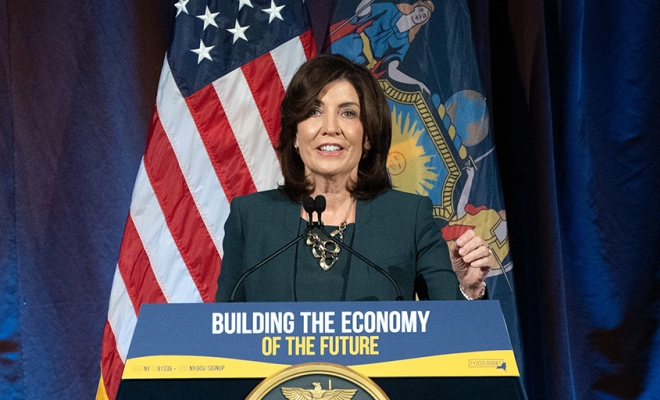Governor Hochul Announces Steps to Advance Artificial Intelligence Capability at SUNY and Make New York National Leader in AI

Governor Hochul’s Innovation Agenda
Governor Hochul’s commitment to advancing New York’s leadership in artificial intelligence builds on her broader agenda to expand cutting-edge technology development in the Empire State. Governor Hochul recently announced that IBM CEO Arvind Krishna and Girls Who Code CEO Dr. Tarika Barrett will co-chair the new Emerging Technology Advisory Board – an independent group of industry leaders tasked with informing and accelerating New York’s transformation into a hub for growth and innovation. The Governor previously signed New York’s historic Green CHIPS legislation to drive semiconductor research, development, and manufacturing in New York State and announced a $10 billion partnership to bring next-generation chips research to NY CREATES’ Albany NanoTech Complex. The Governor has continued to advance a $620 million Life Science Initiative to support innovation in biomedical research. And through strategic investments like the $113.7 million Battery-NY initiative, Governor Hochul has fueled the growth of the sustainability, green technology, and energy storage economies in New York State.
The Governor’s innovation agenda has catalyzed major public and private investments, transforming New York’s economy and creating good-paying jobs of the future. GlobalFoundries recently announced an $11.6 billion investment to expand its chip manufacturing campus in New York’s Capitol Region, creating 1,500 direct jobs and thousands of indirect jobs. In 2022, Micron announced a 20-year, $100 billion investment to create a megafab campus in Central New York, creating 50,000 new direct and indirect jobs and unlocking hundreds of millions of dollars in community benefits. The Governor’s Life Sciences Initiative helped to solidify New York’s selection for the $300 million Chan Zuckerberg Biohub New York, a biomedical research hub in New York City, and significant investments from Schrödinger, Inc., Deerfield Discovery and Development, and other life sciences businesses. Earlier this year, the National Science Foundation also announced a $160 million investment in Binghamton University’s New Energy New York Storage Engine to establish a hub for innovation, technology translation, and workforce development to grow the capacity of the domestic battery industry.
Access to the computing resources that power AI systems is prohibitively expensive and difficult to obtain. These resources are increasingly concentrated in the hands of large technology companies, who maintain outsized control of the AI development ecosystem. As a result, researchers, public interest organizations, and small companies are being left behind, which has enormous implications for AI safety and society at large. Empire AI will bridge this gap and accelerate the development of AI centered in public interest for New York State. Enabling this pioneering AI research and development will also help educational institutions incubate the AI-focused technology startups of the future, driving job growth.
The Empire AI consortium will include seven New York-based founding institutions: Columbia University, Cornell University, New York University, Rensselaer Polytechnic Institute, the State University of New York, the City University of New York, and the Flatiron Institute. By increasing collaboration between New York State’s world-class research institutions, Empire AI will allow for efficiencies of scale not able to be achieved by any single university, empower and attract top notch faculty and expand educational opportunity, and give rise to a wave of responsible innovation that will significantly strengthen our state’s economy and our national security. Empire AI will be hosted at the University at Buffalo.
The initiative will be funded by over $400 million in public and private investment, including a $250 million State capital grant investment, and $25 million over ten years in SUNY funding. The project will also receive more than $125 million from the founding institutions and other private partners, including the Simons Foundation, whose Flatiron Institute works to advance research through computational methods, and Tom Secunda, co-founder of Bloomberg LP and the Secunda Family Foundation, which provides millions of dollars a year in grants to conservation, health care, scientific advancement and other causes.
In addition, as part of the Budget, Governor Hochul signed legislation to prioritize safe, ethical uses of AI as the state continues to build its AI footprint. The legislation includes a requirement that all forms of political communication – including image, video, audio, text or any technological representation of speech or conduct – disclose the use of materially deceptive media.
About The State University of New York
The State University of New York is the largest comprehensive system of higher education in the United States, and more than 95 percent of all New Yorkers live within 30 miles of any one of SUNY’s 64 colleges and universities. Across the system, SUNY has four academic health centers, five hospitals, four medical schools, two dental schools, a law school, the country’s oldest school of maritime, the state’s only college of optometry, and manages one US Department of Energy National Laboratory. In total, SUNY serves about 1.4 million students amongst its entire portfolio of credit- and non-credit-bearing courses and programs, continuing education, and community outreach programs. SUNY oversees nearly a quarter of academic research in New York. Research expenditures system-wide are nearly $1.1 billion in fiscal year 2023, including significant contributions from students and faculty. There are more than three million SUNY alumni worldwide, and one in three New Yorkers with a college degree is a SUNY alum. To learn more about how SUNY creates opportunities, visit www.suny.edu.



